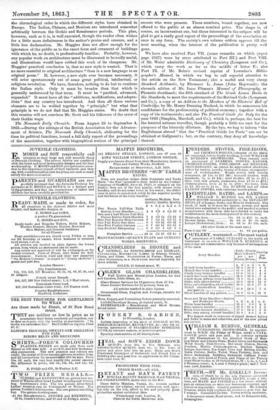27ze Newcastle Daily Chronicle. From Au g ust 25 to September 4,
1863,—During the sittings of the British Association for the Advance- ment of Science, The Newcastle Daily Chronicle, abdicating for the time its political functions, issued a full daily report of the proceedings of the association, together with biographical notices of the principal savantswho were present. These numbers, bound together, are now offered to the public at an almost nominal price. The shape is, of course, an inconvenient one, but those interested in the subject will be glad to get a really good report of the proceedings of the association at once in any form. The society's own volume seldom appears till the next meeting, when the interest of the publication is pretty well gone. We have also received Part VII. (some remarks on which (supra page 2527) were by error attributed to Part III.) and Part VIIL of Mr. Watts' admirable Dictionary of Chemistly (Longman and Co.), which carry the work as far as the middle of letter E ; also Part IX. of Mr. Bohn's revised reprint of Lowndes's Biblio- grapher's Manual, in which we beg to call especial attention to the article on the New Testament; also a useful and very cheap Standard Arithmetic, by Ebenezer L. Jones (John Heywood); the eleventh edition of Mr. Isaac Pitman's Manual of Phonography, or Phonetic shorthand; the fifth standard of The Grade Lesson Books in Six Standards, to meet the requirements of the Revised Code (Longman and Co.); a copy of an Address to the Members of the Electoral Boll of Cambridge, by Mr. Henry Dunning Macleod, in which he announces his candidature for the professorship of political economy; together with a copy of his testimonials; and also The Practical Guide for Italy for the year 1863 (Simpkin, Marshall, and Co.), which is, perhaps, the best for the hurried autumn traveller, though probably a little too curt for the purposes of the leisurely dilettante. By the bye, we beg to inform "the Englishman abroad" that the "Practical Guide for Paris" can not be obtained at Galignani's ; but, on the contrary, they deny all knowledge thereof.






























 Previous page
Previous page